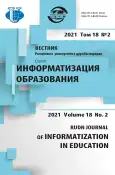STEM education as a factor of national security
- Авторлар: Krasnova G.A.1, Fedotov A.V.1
-
Мекемелер:
- Russian Presidential Academy of National Economy and Public Administration
- Шығарылым: Том 18, № 2 (2021)
- Беттер: 137-151
- Бөлім: LEGAL ASPECTS OF INFORMATIZATION OF EDUCATION
- URL: https://journal-vniispk.ru/2312-8631/article/view/321227
- DOI: https://doi.org/10.22363/2312-8631-2021-18-2-137-151
- ID: 321227
Дәйексөз келтіру
Толық мәтін
Аннотация
Problem and goal. Determination of the place and role of education in the national security system at the present stage based on the analysis of the foreign and Russian regulatory framework, as well as scientific literature on the subject of the study. Methodology. Through the analysis and parallel comparison of the main domestic and foreign regulatory legal acts in the field of security, the key transformations of the perception and vision of education as a factor of national security in foreign countries and Russia were identified, and the causal relationships between the development of the education system and national security were formulated. Results. The problems of national security in all their diversity are significantly related to the state and sustainability of the development of the educational sphere, the impact of which is long-term and has far-reaching consequences in the form of imbalances in the socio-economic, scientific and technological development of the country. Conclusion. The formalization of existing approaches to assessing threats to national security and the economic aspects of ensuring national security will allow us to propose a methodology for quantifying the costs of the education system as a whole (or only for higher education), necessary to optimize the impact of education on national security.
Негізгі сөздер
Авторлар туралы
Gulnara Krasnova
Russian Presidential Academy of National Economy and Public Administration
Хат алмасуға жауапты Автор.
Email: director_ido@mail.ru
ORCID iD: 0000-0002-4848-4935
Doctor of Philosophy, Full Professor, chief researcher
82 Prospekt Vernadskogo, bldg 1, Moscow, 119571, Russian FederationAlexander Fedotov
Russian Presidential Academy of National Economy and Public Administration
Email: fedotovav@ranepa.ru
ORCID iD: 0000-0003-4691-6391
Doctor of Economics, Full Professor, chief researcher
82 Prospekt Vernadskogo, bldg 1, Moscow, 119571, Russian FederationӘдебиет тізімі
- Gusev VS, Stepashin SV, Shults VL et al. Economy and organization of security of economic entities. Saint Petersburg: Ocharovannyy strannik Publ.; 2001. (In Russ.)
- Gusev VS et al. Economics and organization of security of economic entities: textbook for universities. Saint Petersburg: Piter Publ.; 2004. (In Russ.)
- Flattau PE, Bracken J, Van Atta R, Bandeh-Ahmadi A, de la Cruz R, Sullivan K. The National Defense Education Act of 1958: selected outcomes. Washington, DC: Science and Technology Policy Institute; 2006.
- Herman A. America’s STEM Crisis Threatens Our National Security. American Affairs. 2019;III(1). Available from: https://americanaffairsjournal.org/2019/02/americas-stem-crisis-threatens-our-national-security (accessed: 02.12.2020).
- Cotton, Blackburn, Kustoff unveil bill to restrict Chinese STEM graduate student visas & thousand talents participants. Press Release. Available from: https://www.cotton.senate.gov/?p=press_release&id=1371 (accessed: 10.09.2020).
- Charting a course for success: America’s strategy for STEM education. National Science and Technology Council, 2018.
- White DW. Education of the gifted and talented. Vol. 1. Report to the Congress of the United States by the U. S. Commissioner of Education. Washington, DC: U. S. Government Printing Office; 2014.
- American reactions to crisis: examples of pre-sputnik and post-sputnik attitudes and of the reaction to other events perceived as threats: International Affairs seminars of Washington (15-16th October 1958, U.S. President's Committee on Information Activities Abroad). Sprague Committee Records, 1959-1961, Box 5, A83-10.
- OECD. International student assessment (PISA). Available from: https://www.oecd-ilibrary.org/education/international-student-assessment-pisa/indicator-group/english_ d3c1c3ea-en (accessed: 10.09.2020).
- Progress report on the federal implementation of the STEM education strategic plan. A report by the Office of Science and Technology Policy. October 2019.
- UNESCO Institute for Statistics. Global Flow of Tertiary-Level Students. Available from: http://uis.unesco.org/en/uis-student-flow (accessed: 10.09.2020).
- Export of Russian educational services (issue 9). Moscow: Tsentr sotsiologicheskikh issledovaniy Publ.; 2019. (In Russ.)
- Krasnova GA, Polushkina AO. Competition for quota-up to fifty applications. Accreditation in Education. 2019;8(116):42-47. (In Russ.)
- Cutler M. Trump administration restricts Chinese students. Frontpagemag. 25th December 2018. Available from: https://archives.frontpagemag.com/fpm/trump-administration-restricts-chinese-students-michael-cutler/ (accessed: 10.09.2020).
- Huang E, Steger I. Foreign universities are unwittingly collaborating with Chinese military scientists. Quartz, 2018.
- Institute of International Education. Open doors. Available from: https://www.iie.org/ Research-and-Insights/Open-Doors/Data/International-Students/Places-of-Origin (accessed: 10.09.2020).
- Krasnova GA, Krasnova AA. China's strategy for attracting foreign students. Accreditation in Education. 2015;8(84):54-57. (In Russ.)
Қосымша файлдар









